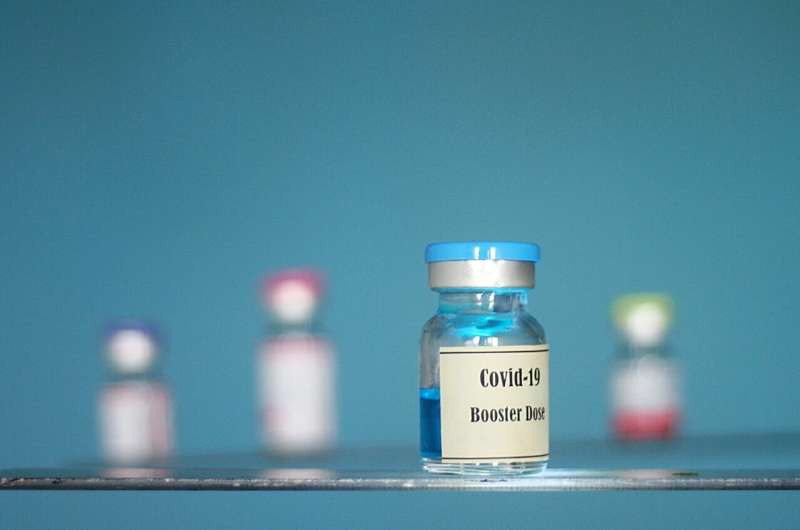This article has been reviewed according to Science X's editorial process and policies. Editors have highlighted the following attributes while ensuring the content's credibility:
fact-checked
peer-reviewed publication
trusted source
proofread
New study suggests more US lives could have been saved by authorizing COVID-19 booster sooner

A new Northwestern University study—led by Bernard Black of Northwestern's Pritzker School of Law and Kellogg School of Management—suggests that the U.S. could have saved many lives by authorizing a COVID-19 booster dose sooner, along with stronger public health messaging. The study uses Israel as a counterfactual example of what the U.S. might have achieved.
Since COVID-19 vaccines became available in early 2021, and a booster dose became available in late 2021, the United States has had a difficult time trying to convince its citizens to get vaccinated and then to obtain a booster dose. Some other countries, including Israel, have achieved higher takeup rates. For boosters, U.S. public health messaging was muddled, leading many older people—the ones who needed a booster dose—not to get one.
The study, "COVID-19 Boosters: If the U.S. Had Matched Israel's Speed And Take-Up, An Estimated 29,000 U.S. Lives Would Have Been Saved," was published in the journal Health Affairs.
The researchers estimate that through June 30, 2022, the U.S. could have saved 29,000 lives among already vaccinated people by authorizing boosters sooner, and matching Israel's uptake level and uptake speed. Moving more slowly on boosters than the U.S. actually did, as some advocated, would have cost many additional lives. "Every week mattered," Black said. Booster rollout saved 41,000 lives through June 2022, compared to no booster authorization.
To compare the two nations, researchers used U.S. national data on vaccination and mortality rates, data on vaccine effectiveness from Milwaukee County, Wisconsin, (where they were able to link vaccination and mortality records) and Israeli data on vaccination rates.
The initial two-dose series of mRNA vaccines were highly effective initially, but their effectiveness waned over time, against both COVID-19 infection and severe disease. Israel was one of the first countries to vaccinate its population in early 2021, and was, therefore, also first to see the effects of waning.
In mid-2021, Israel faced an exponential rise in infections, hospitalizations and deaths, many among the already vaccinated. In response, Israel authorized a booster dose of the Pfizer-BioNTech vaccine in late July 2021, with strong public health messaging on the importance of the booster dose.
"The booster campaign reversed the Israeli infection wave," Black said. "Israel became a laboratory for the rest of the world on vaccine waning and the value of a booster dose in reducing hospitalization and mortality rates for persons aged 60+. Israeli evidence showed that boosters were both effective and highly safe."
The U.S. moved more slowly to authorize boosters. It authorized boosters almost two months later—with boosters largely restricted to those age 65 and older or with major health complications. Senior U.S. policymakers wanted to move more quickly, but the U.S. regulatory system requires FDA approval before vaccinations and boosters can be readily available. The FDA, however, resisted acting quickly, with substantial internal opposition to approving boosters at all.
"The FDA is a science agency," Black said. "They are accustomed to moving slowly and carefully vetting new drugs and vaccines and approving them only if benefit and safety are firmly established."
The study illustrates the risks of regulatory caution in the middle of a pandemic. "Israel had highly credible data, which it shared with U.S. regulators, but the FDA wanted to see more U.S. data and not rely primarily on Israel," Black said. "That U.S. data did not yet exist, because the U.S. vaccinated its population more slowly than Israel, and lacked Israel's ability to collect real-time data."
More information: Bernard Black et al, COVID-19 Boosters: If The US Had Matched Israel's Speed And Take-Up, An Estimated 29,000 US Lives Would Have Been Saved, Health Affairs (2023). DOI: 10.1377/hlthaff.2023.00718




















